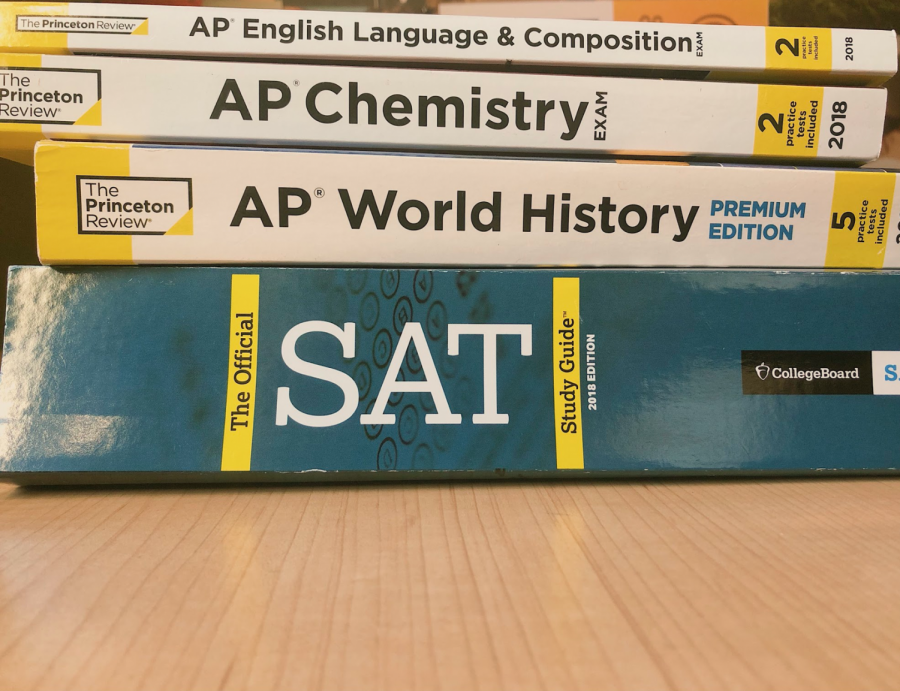The College Board Makes Changes to 2021 SAT and AP Exams
February 25, 2021
The College Board recently announced major changes to the 2021 Scholastic Aptitude Test (SAT) and Advanced Placement (AP) Exams as a response to COVID-19, affecting many students at Eleanor Roosevelt High School (ERHS) and around the world.
For many years, high school students have taken the College Board’s SAT suite of exams as a part of their journey towards college; at ERHS, the SAT is typically offered to all juniors for free in early March. However, on January 25, 2021, the Prince George’s County Public Schools (PGCPS) Testing Office announced the cancelation of the March SAT School Day Administration, leaving many juniors unsure of their next step. This news came just one week after the College Board announced two major changes to the SAT: effective June 2021, students will no longer be offered the optional essay and effective immediately, all SAT Subject Tests are canceled.
The essay portion of the SAT has been optional for many years, and most colleges do not require that students take it to be admitted. In an attempt to streamline the exam, the College Board has decided to stop offering the essay beginning after the June 2021 administration. According to the College Board’s blog, “there are other ways for students to demonstrate their mastery of essay writing” without the essay. The SAT “will continue to measure writing throughout the test” through “tasks on the SAT Reading and Writing and Language sections.”
Additionally, all SAT Subject Tests in the US are canceled immediately, and will no longer be offered internationally after June 2021. As their AP program expands, the College Board wants to “reduce demands on students” by reducing the number of exams they can take. The AP program has courses and exams that cover the same content as Subject Tests, making Subject Tests “no longer necessary for students to show what they know,” according to the College Board.
Amid COVID-19, these changes are an additional challenge that students face right now. Junior Cora Jackson has registered for the SAT six times, and all but one of her exams were canceled due to test site closure. “Taking the SAT again seems like gambling,” she said. “It all feels very out of my control.” Like many students, Jackson also faces lots of parental pressure to do well on College Board exams. She is planning to take the SAT again because her parents are “unhappy” with her score, but stated that she “wouldn’t take it again if it was [her] choice.”
Although she recognizes the value of the SAT right now because “the pandemic has taken away opportunities to build up other aspects of [her] college application,” Jackson is glad to see parts of the SAT go. Despite feeling like she “wasted a lot of time” studying for the essay portion of the SAT and Subject Tests, she believes that these changes “hint at the fall of College Board.”
Jackson hopes for “racist standardized tests like the SAT to finally be abolished. With all of the College Board’s frantic changes during these times, I am optimistic that it will happen soon,” Jackson said.
The third major change that the College Board is making this year regards the administration of AP Exams. Unlike 2020, all 2021 AP Exams will be full length—about three hours—just as they were before 2020. Instead of offering all exams once in a two week window, the College board has created three different testing windows, allowing each exam to be offered three times: May 3-17, May 18-28, and June 1-11. In the first round, all exams will be offered on paper in schools; in the second and third rounds, some exams will be offered in schools and some will be offered digitally, allowing students to take them from home. The College Board is allowing each school’s AP coordinator to decide when students will take their exams, and neither ERHS nor PGCPS has announced a decision yet.
The College Board has not provided many specifics on digital exams yet, but they have said there will be very few differences between in-person and digital exams, relating only to “testing format and exam security,” not content.
The confusion and lack of information surrounding this year’s AP Exams concerns many students. Junior Divya Chappa, who is taking four AP Exams this year, stated that she is “upset about these changes,” but still wants to take her exams. “We’re all working hard in class and still deserve the chance to earn the AP credit,” she said. Like many students, she also has safety concerns regarding in-person exams, saying that she “wouldn’t feel comfortable” around other students, and would rather not take a three-hour test while wearing a mask. “I’ve gotten so used to learning online that I prefer test-taking from the comfort of my own home,” Chappa added.
Although many students have turned to teachers for answers, they are just as confused as students. Mr. Richard Renyer, who teaches AP World History Modern at ERHS, said that he hasn’t “seen any specifics” regarding changes to the exams. “We don’t know what the county is going to recommend,” he said, referring to taking exams in person or at home, “and we were told not to talk about it until they make a decision.”
Mr. Renyer also has some worries concerning how well his students are understanding course material. “I don’t want to sacrifice teaching content or skills,” he said, “but we’re losing time.” Without physically being in the classroom, Mr. Renyer said “it’s hard to tell if [students] are grasping the material.” However, he believes that as long as students “keep moving forward” and “trust the process” that AP teachers use to prepare their students, success will come.
“It would be really nice if we could know what we’re doing now,” Mr. Renyer concluded. “It all feels very arbitrary because we don’t know where the end is.”
For more information and future updates regarding the SAT and AP Exams, visit https://www.collegeboard.org/.




